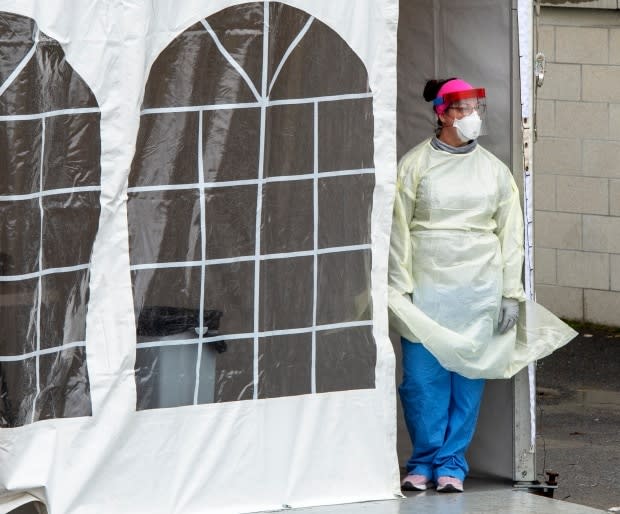COVID-19 in Montreal: Mayor Valérie Plante urges people to stay in their neighbourhoods
Montreal Mayor Valérie Plante said the city is prolonging its local state of emergency to continue responding "efficiently" to the COVID-19 crisis.
The city declared a local state of emergency on March 27 over concerns that the outbreak could ravage the city's homeless.
Everyone has to comply with the federal and provincial public health guidelines, she said, while thanking those residents who have been doing their part to prevent the spread of COVID-19.
At the same time, Plante said the city's police service is increasing its presence in Montreal's six largest parks, including Mount Royal, Maisonneuve, La Fontaine, Laurier parks and along the Lachine Canal, to ensure people aren't gathering in groups.
The parks were chosen not just because they are popular, but because they are in dense neighbourhoods, she said.
Fines will be issued to those who violate public health guidelines, such as gathering in groups of two or more people or not keeping at least two metres away from one another. Police services across the province have been authorized to hand out fines ranging from $1,000 to $6,000.
Line Carbonneau, assistant director of the Montreal police service, said the SPVM has had a lot of calls from residents concerned about people not respecting guidelines.
Carbonneau said no more warnings will be issued. As soon as police officers see people are not respecting guidelines, they will be identified, and a report will be sent to Quebec's Director of Criminal and Penal Prosecutions (DPCP).
"It is not the time to go running in groups," said Plante. "We do not close down the parks. For a lot of Montrealers, this is their only way to get a bit of green. A lot of people don't have a backyard or even a balcony."
"I'm hoping everyone will follow the recommendations so we can keep our parks open," she said."

Parking stickers for health-care workers
Plante said the city is making COVID-19 parking stickers available to essential health-care workers who need to park near their place of work.
She said the Palais des congrès will open its parking lot to health-care workers, as well.
The BIXI bike-sharing service will start in mid-April as planned, she said, as it is a designated service that allows people to get to work or to the grocery store without relying on public transit.
She said the bikes will be more frequently cleaned to ensure they are safe to use.
"Don't take a BIXI to bike around the city," she said. "It is to be used if you need it."
'Montreal is the epicentre of the epidemic'
Montreal remains the hardest-hit region in the province, with 2,642 cases as of 1 p.m. Thursday. That's a jump of 545 cases in 24 hours.
"Montreal is the epicentre of the epidemic," said Dr. Mylène Drouin, director of Montreal's public health agency.
She said a significant proportion of those contracting COVID-19 in Montreal are young, although most who have died are aged 80 and over.
Some parts of the city are more affected than others, she said, but nearly all are seeing an increase in numbers of infection as community transmission spreads.
Among efforts to contain the spread, public health authorities will be focusing on large multiplexes, especially those with large populations of seniors, Drouin said.
She said the city will be working with owners and building managers to ensure communal spaces are kept clean, and residents will be warned if somebody living in the building has tested positive.
She said public health has increased its capacity for screening, but the effort is going to target specific groups and places where it appears there is a risk of outbreak and a need to limit the spread. For now, she said the focus is health care personnel and other essential workers, as well as residents of long-term care institutions, she said.
Until tests are opened to the rest of the population, she said, it is crucial that people who have symptoms or suspect they are infected stay home.
There will soon be a website where people can declare themselves as positive if they believe they have COVID-19, Drouin said.That will allow officials to track the spread of the virus.
Outbreak at Verdun hospital
Montreal's Verdun Hospital has 35 new cases of COVID-19 and five doctors are in isolation. The outbreak is linked to asymptomatic doctors who did hospital rounds.
As soon as the doctors became symptomatic, they were taken off duty, according to Jean Nicolas Aubé, spokesperson for the region's health agency, the CIUSSS Centre-Sud-de-l'Île-de-Montréal.
"We have, at this time, preventatively tested all patients," he said in an email. "Each identified case has been isolated."
Many of the 35 cases are asymptomatic and do not necessarily have a traceable origin to the Verdun hospital, he said.

Aubé said the hospital was able to react very quickly because the concept of a "hospital within a hospital" was already implemented in Verdun.
Additional measures to protect staff and patients were already in place in all units before the outbreak.
Those measures included testing every patient admitted to the hospital before they were moved to a unit. There are designated areas and protocols for patients who test negative and for those who test positive, Aubé said.
"All caregivers in the hospital wear personal protective equipment," he said. "People are reminded not to visit hospitals unless it is vital and essential."
During Thursday's briefing, Drouin said there are outbreaks at a couple of hospitals, and that is why it is extremely important that every essential worker, especially those in health care, stay home if they have symptoms.
She did not go into details about where these outbreaks are but reiterated the importance of testing health-care workers for COVID-19. She concurred, however, that tests are not reliable among asymptomatic people, and the virus has an incubation period of up to 14 days.

